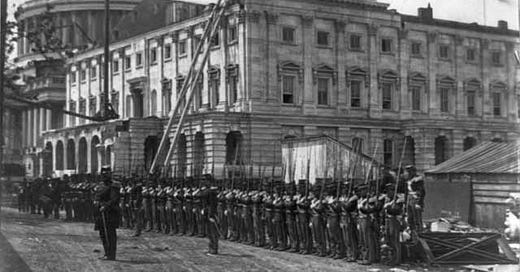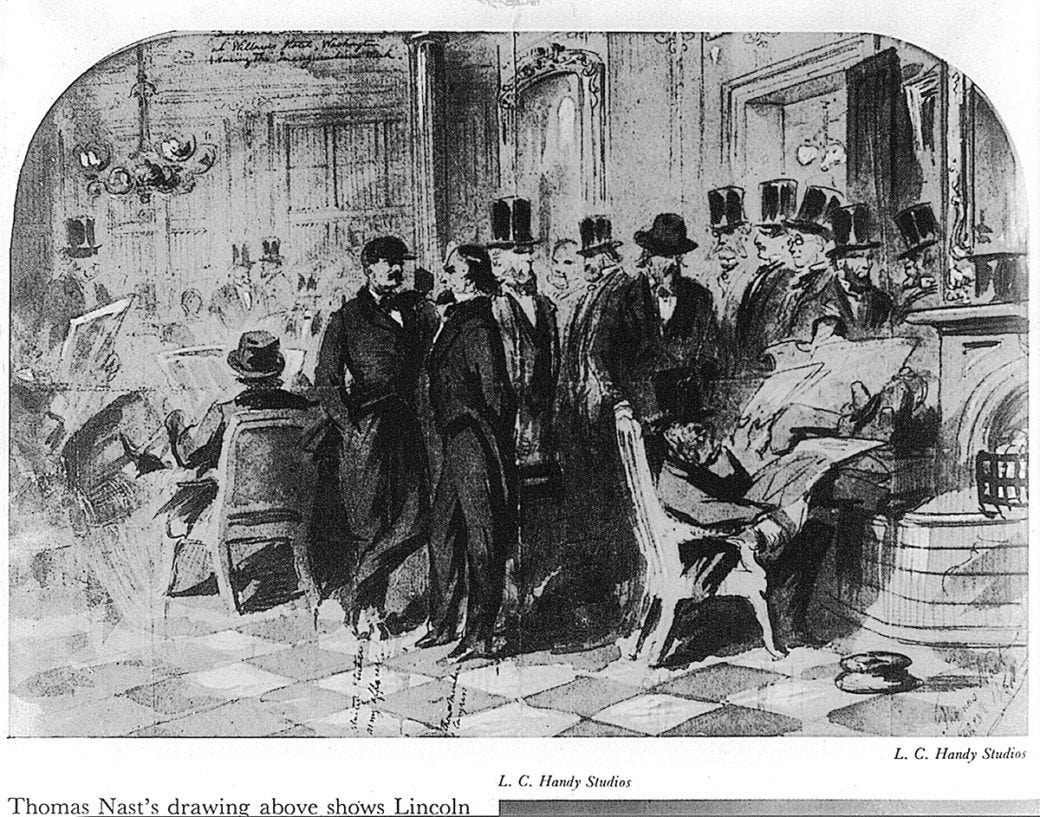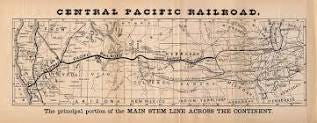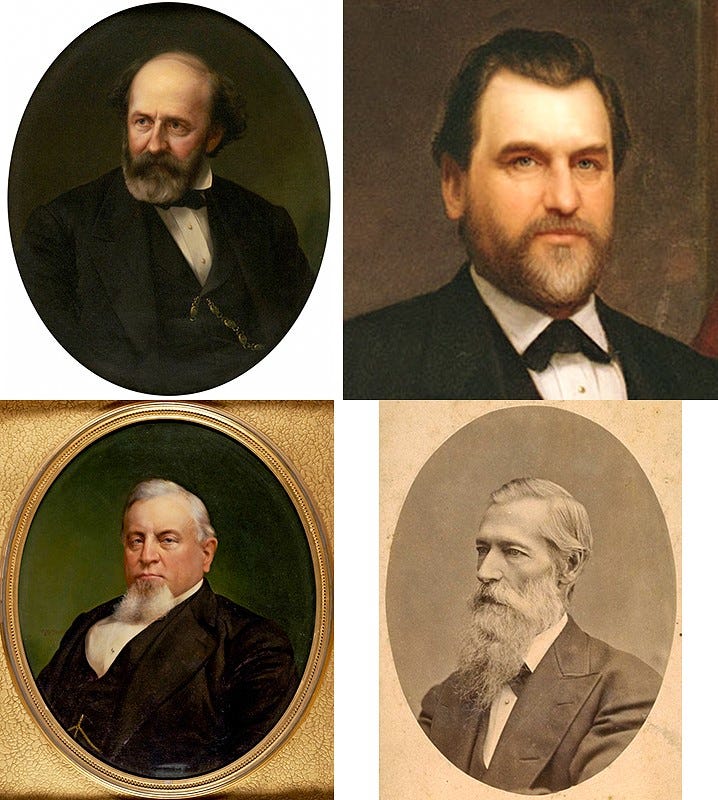Ted & Anna Judah in Civil War Washington
In the decade before the Civil War, Northern and Southern politicians were locked in a fierce battle over the proposed routes of a railroad that would cross the whole country, joining the rich new state of California to the East.
Thousands of Americans were dying every year on the perilous routes to the West. Only the wealthy could afford the slightly safer passage on one of the sea routes; or the provisions, oxen, horses, wagons, that would increase the odds of survival on the land route.
The chief obstacle to a transcontinental railroad was the intensifying hostility between North and South over the issue of the expansion of slavery. Secretary of War Jefferson Davis used his power to propose a railroad plan that would pass through only slave states. Such a route would ensure the economic and political domination of the slave economy.
Brilliant railroad engineer Theodore Judah was determined to prove the viability of a central route that would keep the railroad out of the hands of the slave powers. His partner in the mission was his wife, Anna: a talented artist whose paintings and drawings illustrating Ted’s proposals—and her powers of persuasion—helped bring congressmen around to supporting Ted’s route.
To the idealistic Judahs, a railroad would mean safe, affordable travel for the masses, and a greater equality of opportunity for all. And with the election of former railroad lawyer Abraham Lincoln and the eruption of war, Ted and Anna knew the odds had finally shifted in their favor.
Read After the Gold Rush from the beginning:
After the Gold Rush, Chapter 42
October 9, 1861: Washington, DC
Ted & Anna Judah
Ted and Anna stood at the counter of the Washington printer’s shop, and Ted proudly extended his latest flyer to the clerk.
“We should like one thousand copies of this printed, please.”
He had worked throughout the summer not just to finish the survey, but also to compile a complete report on distances and costs. The board members of the newly formed Central Pacific Railroad had passed a resolution naming Ted as the company’s accredited agent “for the purpose of procuring appropriations of land and U.S. Bonds from the government to aid in construction of the road,” and handed him a suitcase full of Central Pacific stock with which to “secure aid” in Washington.
“Bribes,” Anna said.
“It is how these things are accomplished, my love,” Ted answered cheerily.
Anna knew this meant another long sea journey back to Washington. But she stifled a sigh, and started packing.
Union soldiers in Washington - uncompleted Capitol Dome in background
The Judahs found the Capitol nearly unrecognizable: crammed with tens of thousands of armed Union soldiers, a sea of blue uniforms. Anna was appalled, and heartsick, at the sheer numbers of soldiers who arrived every morning at the Sixth Street Wharf. Horribly wounded, some devastatingly ill, some mutilated beyond recognition. All over the city, churches, schools, hotels, had been converted to makeshift hospitals.
Once Ted and Anna had settled into their rented rooms, Ted began to spend a great deal of time at the Willard Hotel, now the networking center of the city. Generals, statesmen, heads of foreign countries—the whole world seemed to be doing business out of its rooms.
in the Willard Hotel
When the Judahs hauled the boxes of copies of the survey to Congress, Anna marveled at the changed appearance of the hall. “The chambers are half empty.”
“Empty of the Southern half. To our winning advantage,” Ted exclaimed cheerily.
His confidence was as high as ever. In Abraham Lincoln hey had a new, pro-railroad President, who’d won a new, Republican Congress. The Central Pacific’s president was the newly elected Governor of California, Leland Stanford.
But the advantages proved even greater than Ted dreamed.
With half of Congress gone, the government was left severely understaffed. Ted pounced on the opportunity by volunteering for the Senate Committee on Pacific Railroads. He had become so well-known on the Hill that in a remarkable stroke of luck and insider politics, he was able to get himself appointed not just secretary of the Senate Committee, but also clerk of the House Committee of Pacific Railroads, and clerk of the House Main Committee on Railroads. He now had access to the floor of the Senate and charge of all papers relating to the transcontinental railroad.
He was given the office that had belonged to the vice-president. Ted immediately printed up a strip map of the proposed alignment of the Central Pacific Railroad. It was 30 inches tall by 66 feet long, and he tacked it up along his office walls, so he could look up and see the entire railroad around him.
And he proceeded to sell the railroad as essential to the Union. He positioned the road as an urgent war measure, necessary to move troops and to connect the West to the rest of the nation. And he could not help but boast to his fellow Central Pacific directors.
Sacramento, California: The Associates
In the offices of the Central Pacific, upstairs at Huntington & Hopkins, Stanford read Judah’s telegram aloud to his colleagues:
“I may here mention I have been appointed Secretary of the Senate Pacific Railroad Committee, having charge of all their papers, etc. being present at their meetings, and having the privilege of the floor of the Senate, while upon motion of Mr. Sargent, I was appointed Clerk of the House subcommittee, who held their meetings in our committee room, and had the privilege of the floor of the House, and I afterwards acted as the Clerk of the main House committee.”
The Associates shifted in their seats, grudgingly impressed.
“I don’t know if he’s lucky or just—lucky,” Crocker drawled.
“He has his role,” Hopkins admitted.
Of course there were protests about Ted’s appointments from enemies of the Central Pacific, who were beginning to realize that these four Sacramento shopkeepers were on the brink of becoming the most powerful men in the state.
And when President Lincoln publicly proclaimed that a railroad bill was going to be passed, Collis Huntington realized that leaving the work to Judah was not in his own best interests.
He packed to go to Washington himself.
Why subscribe?
After the Gold Rush is a reader-supported publication. To receive a monthly roundup of new posts and support this work, please consider becoming a free or paid subscriber.
Feedback, Comments, Likes and Shares are hugely helpful and much appreciated!







